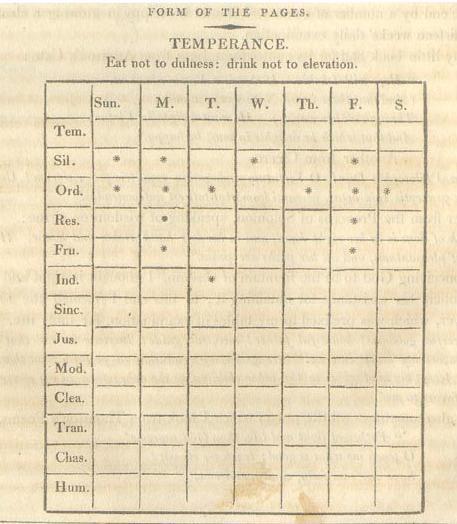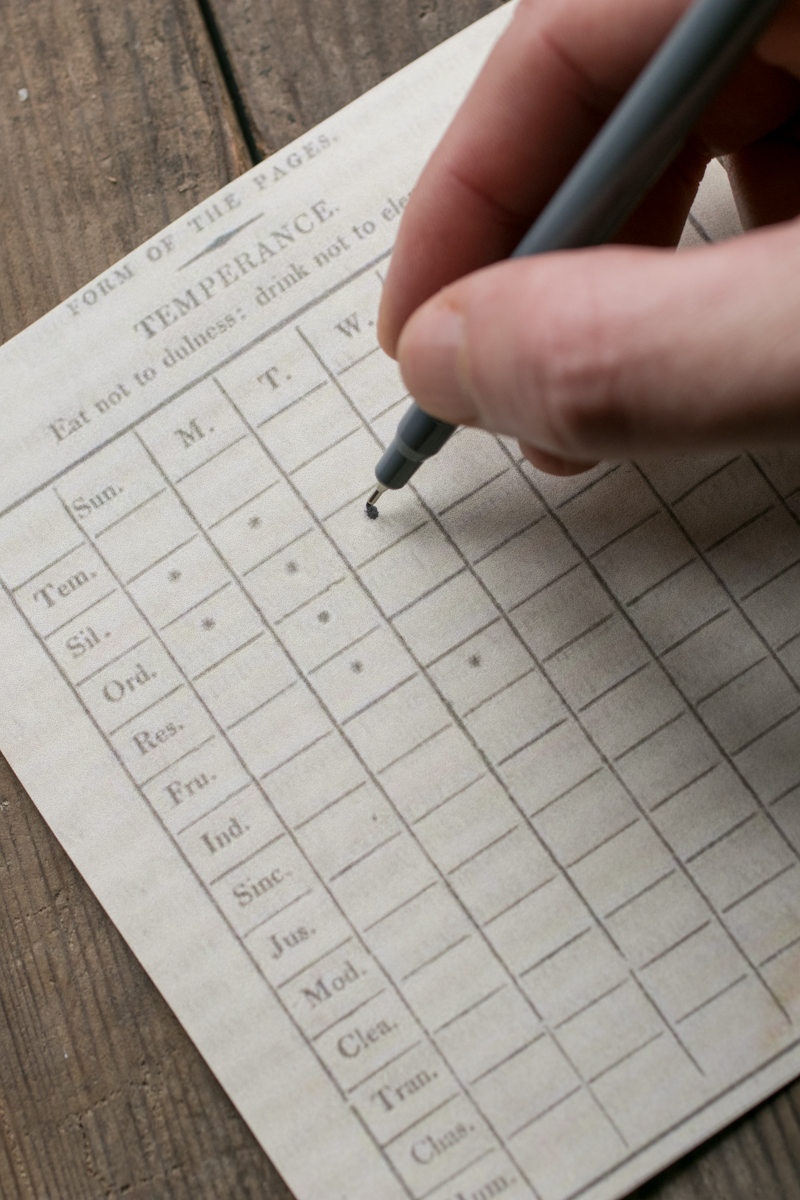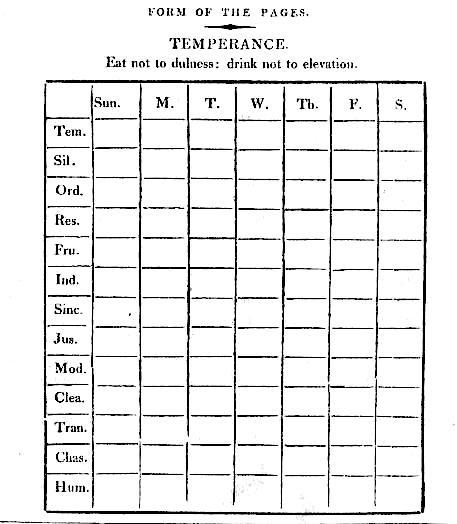Use Benjamin Franklin’s 13 Virtues to Help You Be a Better Person this Year
If you're looking for a New Year's resolution list to help inspire your personal betterment this year, look no further than this founding father's temperance chart. Read on to see how you can print your own.

As far as the truly great characters from U.S. History to which we might look for timeless advice, it's hard to beat Benjamin Franklin. (We still love you, Mark Twain!) Franklin was born into a family of very modest means, but he manage to use his basic education (he stopped going to school at age ten) to become a successful author, scientist, statesman, printer, politician, inventor, humorist, civic activist, diplomat, and $100 dollar bill appear-er.
Ben's autobiography is worth a read in its entirety, and you can grab a free download or inexpensive copy here. But, specifically to this New Year conversation: Benjamin Franklin believed that most of his achievements, successes, and personal sense of accomplishment stemmed from his adherence to the “thirteen virtues” he identified to best represent his value system.
Ben Franklin's New Year's Resolution List:
1. Temperance: Eat not to dullness. Drink not to elevation.
2. Silence: Speak not but what may benefit others or yourself. Avoid trifling conversation.
3. Order: Let all your things have their places. Let each part of your business have its time.
4. Resolution: Resolve to perform what you ought. Perform without fail what you resolve.
5. Frugality: Make no expense but to do good to others or yourself: i.e., Waste nothing.
6. Industry: Lose no time. Be always employed in something useful. Cut off all unnecessary actions.
7. Sincerity: Use no hurtful deceit. Think innocently and justly; and if you speak, speak accordingly.
8. Justice: Wrong none by doing injuries, or omitting the benefits that are your duty.
9. Moderation: Avoid extremes. Forbear resenting injuries so much as you think they deserve.
10. Cleanliness: Tolerate no uncleanness in body, clothes, or habitation.
11. Tranquility: Be not disturbed at trifles, or at accidents common or unavoidable.
12. Chastity: Rarely use venery but for health or offspring; never to dullness, weakness, or the injury of your own or another's peace or reputation.
13. Humility: Imitate Jesus and Socrates.

He was so committed to the principle that, for decades, he carried around little cards representing each virtue on a grid with the days of the week. (Remember, he was a master at the printing press, and so likely designed and printed these up for himself. OG DIY.) In each row, he listed an abbreviated virtue, with the columns arranged Sunday, Monday, Tuesday, etc. He would then use the grid to track his adherence to the principles: at the end of each day, he'd reflect, and note which virtues he upheld through his actions, decisions, and conversations that day.
Franklin so believed in cultivating these virtues that he had not one, but thirteen separate versions of these cards, each featuring one particular value. He'd list and define the virtue at top, so he'd pay special attention to cultivating it each week. After thirteen weeks, he'd cycle back through.
How to Print Your Own Temperance Chart – New Year's Resolutions
Here's a version of Ben Franklin's resolution chart you can download and print off yourself:
Okay, So What?
All this is interesting history from two hundred years ago. But, like many virtue ethics systems (such as Aristotle and many popular men's lifestyle blogs), it's a little abstract, and easy for the individual to say “Yes, I did all those things today. I am so virtuous!” So, is there a lesson here for 2018?

I think there are a few.
- First, the act of not only listing, but defining the values in short, easy-to-clarify sentences has a lot of practical value. It's a real opportunity for personal reflection, as well as forcing yourself to identify what these broad, partially-archaic terms actually mean for your life.
- Some of Ben's values are pretty good. And their definitions are even better. For example, you see “order” and you might think, “oh, great. Some meaningless, old time-y, overly-masculine thing about structure.” But then you realize – he's specifically talking about staying organized at work, and making sure you take care of what you need to take care of. And it's completely appropriate to include a sense of “If each part of your business has its time, then you should let it creep into other parts of your life.” As in…don't work too hard that you have no other life. Any generation can agree to that.
- The tracking component makes sense. It's somewhat of a lightweight journaling: an intentional sit-down to go over how things are going. It's a slight sense of record keeping, without the additional effort of having to write all those things down long form. Anyone who journals regularly will attest that it's rarely about going back and reading what you've documented. It's about the reflection process, and how that moment helps clarify what's going on.
- The grid system is easy to create in software to print out, or you could just grab a ruler and start drawing and photocopy. Or, you could use a spreadsheet format and simply track on your phone, and there's even a “Ben's Virtues” app for smartphones.
Some of Benjamin Franklin's thirteen virtues will work for you. Some of them won't.
I think Ben's understanding of tranquility and humility speaks volumes to our current era, but the list needs updated to include components of personal gratitude and a sense of social responsibility and justice. The point is, dude found him a way to live out the person he wanted to be, and it sounds like the system worked out pretty well for him. If we all want to have the best year possible, perhaps we can go and do likewise.










